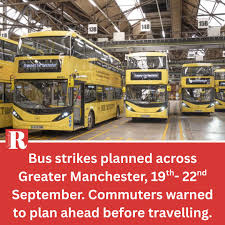Understanding the Bus Strikes in Manchester

Introduction
Bus strikes in Manchester have recently brought significant disruption to the city’s transportation system, affecting thousands of commuters daily. The strikes, primarily driven by disputes over pay and working conditions, highlight the critical role that public transport plays in urban mobility and the ongoing challenges within the transport sector.
The Current Situation
As of October 2023, several bus driver unions in Manchester have initiated strikes, claiming that wages have not kept pace with the rising cost of living. Reports indicate that bus drivers have been demanding a pay increase of around 5%, while employers have proposed a rise of only 2%. This gap has led to widespread walkouts, particularly affecting key routes in and out of the city centre.
Local transport authorities have reported significant delays and cancellations, prompting many commuters to seek alternative travel methods, including cycling, walking, and carpooling. Additionally, nearby areas have experienced an increase in traffic congestion as fewer buses are available to accommodate daily commuters.
Public Response and Impact
The public response has been mixed. While many commuters understand the drivers’ plight, others express frustration at the lack of public transport availability. Some businesses have also reported losses due to decreased foot traffic, while schools have had to adapt to new transport arrangements for students.
Efforts Towards Resolution
Negotiations between union leaders and bus operators are ongoing, with both sides expressing a willingness to reach an agreement. Talks facilitated by the Greater Manchester Combined Authority aim to bridge the pay gap and address concerns about working conditions. Community leaders are urging both parties to consider the implications of the strikes on local economies and daily life in Manchester.
Conclusion
The bus strikes in Manchester underscore the critical balance between fair wages for workers and reliable public services for residents. As negotiations continue, many hope for a swift resolution that restores bus services and mitigates the disruption experienced by commuters. The outcome of these talks may set a precedent for similar disputes across the UK, making it a pivotal moment in the discussion about public transport and workers’ rights.









